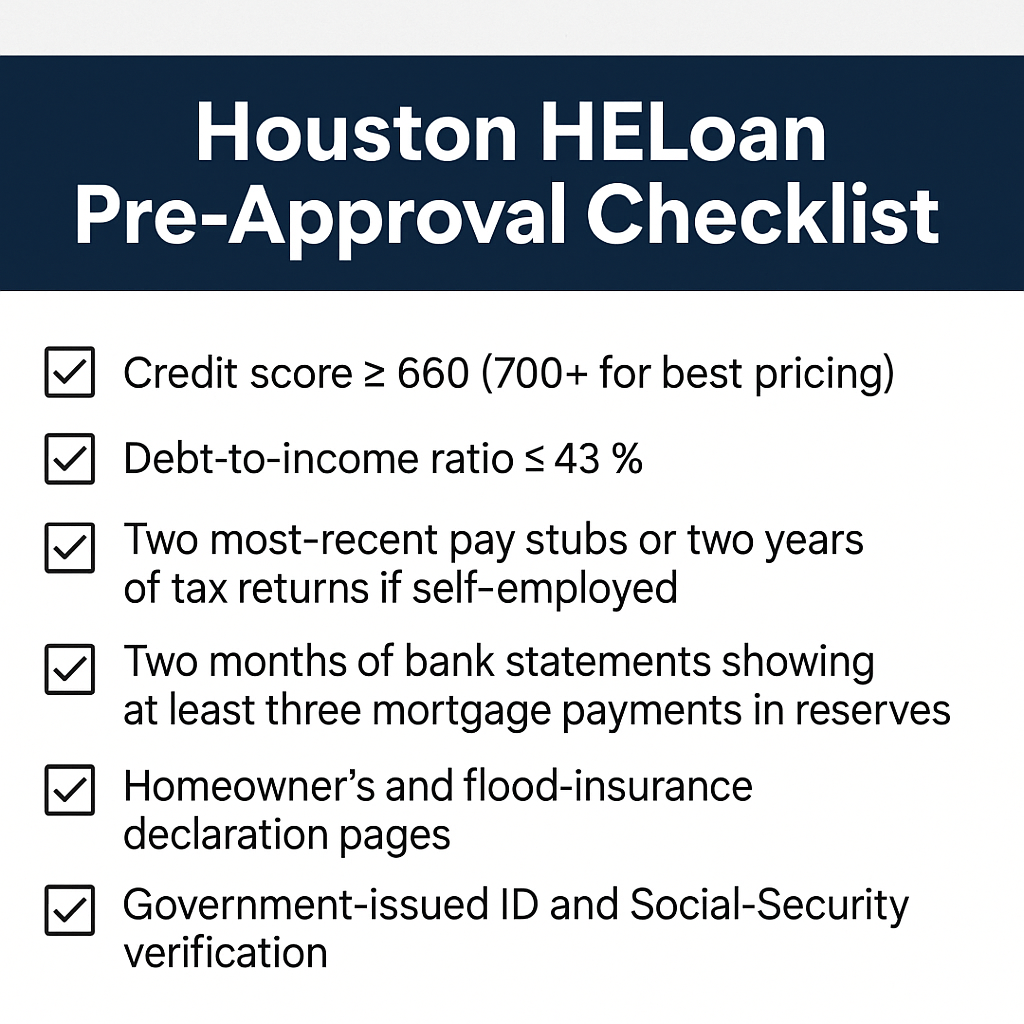The Pros and Cons of a Home Equity Loan in Houston
Key Takeaways: Should You Tap Your Houston Home Equity?
- Fixed-rate HELoans lock today’s sub-8 % rates even if national rates keep climbing.
- Texas Constitution caps your combined loan-to-value at 80 %—large cash-outs aren’t possible if you bought with 10 % down in 2023.
- Closing costs are legally limited to 2 % in Texas—lower than most states.
- Flood-zone premiums and homestead protections shape foreclosure risk on the Gulf Coast.
- A HELoan can bridge the down-payment for second-time buyers upgrading to a larger Houston home.
What Is a Home Equity Loan and How Does It Work in Texas?
A home-equity loan (HEL) lets you convert up to 80 % of your home’s market value, minus your first-mortgage balance, into a one-time lump sum at a fixed interest rate. In Texas, all such “cash-out” loans are governed by Article XVI § 50(a)(6). The statute enforces:
- A combined loan-to-value (CLTV) ceiling of 80 %.
- Mandatory 12-day “cool-off” period after receiving disclosures.
- Total lender fees ≤ 2 % of the loan amount (excluding third-party title & appraisal).
The lender files a second lien behind your primary mortgage. You repay principal and interest in equal monthly installments over 5 – 30 years.
Who Should – and Who Shouldn’t – Use a HELoan in Houston?
Ideal borrowers: second-time buyers needing bridge liquidity, owners financing value-boosting remodels (e.g., ADU or hurricane-hardening upgrades) and households consolidating credit-card balances above 18 % APR.
Sketchy fits: homeowners with LTV > 78 %, oil-sector workers facing variable income, and anyone lacking emergency savings—because missing payments risks foreclosure despite Texas’s homestead protections.
Why Choose a HELoan Over a HELOC or Cash-Out Refi?
- Fixed-rate predictability: Houston HELOCs float at prime + 1 – 2 %, so a Fed hike can spike payments.
- No restart of 30-year clock: HELoans don’t reset your primary mortgage amortization like a refi does.
- Texas fee cap: HELoan origination can be cheaper than HELOCs that charge annual fees and draw fees.
When Do Houston Lenders Approve HELoans?
Expect this timeline:
- Day 0: Apply → receive § 50(a)(6) disclosures.
- Day 1-3: Provide W-2s, pay stubs, homeowner’s-insurance binder.
- Day 4-10: Home appraisal & title search.
- Day 12: Earliest legal date to close.
- Day 15: Closing + three-day right of rescission.
- Day 18-21: Funds wire to your checking account.
How Much Does a $100k Home Equity Loan Cost Per Month?
| Loan Size | Term | Rate* | Monthly P&I | Total Interest |
|---|---|---|---|---|
| $100,000 | 10 yrs | 7.75 % | $1,188 | $42,580 |
| $100,000 | 15 yrs | 7.85 % | $949 | $70,820 |
| $100,000 | 20 yrs | 7.90 % | $817 | $96,155 |
| $100,000 | 30 yrs | 8.05 % | $739 | $166,070 |
*Illustrative Houston averages, June 30 2025. Actual APR varies by credit score and lender.
What Are the Main Pros of a Houston Home Equity Loan?
- Stable payments — lock in a 15- or 20-year rate before the next Fed move.
- Low out-of-pocket fees — 2 % origination cap protects borrowers.
- Tax advantages — interest remains deductible when proceeds “substantially improve” your homestead (consult your CPA).
- Fast funding — three-week pipelines beat 45-day refis.
- Bridge-loan alternative — frees equity for the next down-payment without a contingent-sale contract.
What Are the Cons and Hidden Catches?
- Second-lien risk: foreclosure is rare but real if you default.
- 80 % CLTV ceiling: limits cash-out amount for recent buyers.
- Must re-qualify: expect ≥ 660 credit & 43 % DTI.
- No “re-cash-out” for 12 months: Texas law forbids back-to-back equity extractions.
- Flood insurance costs: FEMA maps + private-market premiums may rise, raising the total housing payment.
Cost & Coverage Breakdown
| Expense | Typical Houston Cost | Included in 2 % Cap? |
|---|---|---|
| Origination / Underwriting | $750 – $1,000 | ✔ |
| Processing Fee | $350 | ✔ |
| Title Insurance (Texas promulgated) | $830 | ✖ |
| Appraisal (single-family) | $475 | ✖ |
| Flood-zone Cert. | $22 | ✔ |
| Recording & Doc Stamps | $95 | ✔ |
Expert Tips to Maximize Equity Without Losing Sleep
-
- Keep CLTV at ≤ 70 %; you’re unlikely to dip underwater in a moderate market correction.
- Set payments on auto-draft and keep three mortgage payments in cash reserves.
- Bundle an umbrella liability policy when renovating—contractor accidents happen.
- Compare fixed HELoan quotes from banks, credit-unions and Texas-based online lenders within the same 14-day credit window.
Exit Strategies & Timing Your Refinance
-
Watch the 10-year Treasury. When it slips below 3 %, 15-year mortgage rates in Texas often drop under 6 %.
-
Aim for a 0.75-point rate drop or a 30- to 15-year term cut with a break-even of 36 months or less.
-
Bundle liens. Rolling the first mortgage and HELoan into one 15-year refinance can shave $40 k-plus in interest on a $375 k balance.
-
Keep DTI under 43 %. Paying off small auto loans or cards before applying boosts approval odds and pricing.
Texas Cash-Out Rules at a Glance (Article XVI § 50(a)(6))
-
Combined LTV cap: 80 % of a home’s appraised value
-
Fee limit: Lender fees may not exceed 2 % of the loan amount (title insurance and appraisal are excluded)
-
Mandatory waiting period: 12 calendar days between disclosure and closing
-
One equity loan per year: You can’t do two cash-outs within the same 12-month window
-
Permanent cash-out status: Any future refinance of this loan is still treated as a cash-out in Texas
Case Study – From Bungalow to Duplex in the Heights
Borrowers: “Sara & Miguel,” two software engineers who bought a 1940s two-bedroom bungalow in 2020 for $415,000 (20 % down). By early 2023 their first-mortgage balance had amortized to $262,000; a fresh appraisal valued the property at $475,000, giving them ≈ 45 % equity.
Goal: Convert the detached two-car garage into a 450-sq-ft accessory dwelling unit (ADU) to rent to traveling nurses and energy-sector contractors.
Financing move: Fixed-rate HELoan of $120,000 at 7.25 % APR (20 yrs). Texas’s 80 % CLTV limit kept the max around $118 k, so they paid $2 k of closing costs out of pocket to stay compliant.
Budget breakdown:
- Architect & structural plans – $6,800
- City permits & impact fees – $3,400
- Foundation & framing – $28,000
- Plumbing, electrical, HVAC – $26,500
- Interior finishes & appliances – $33,200
- 10 % contingency – $12,100
- Total hard cost – $110,000
The remaining $10,000 paid for a six-month builder’s-risk policy, furnishings for mid-term renters, and first-year flood insurance.
Cash-flow impact:
- HELoan payment – $1,767 / mo
- Furnished-rental income – $1,500 / mo
- Net before reserves – ≈ $350 positive cash flow (about 85 % of the payment covered)
After-renovation value (Mar 2024): New appraisal at $585,000.
- First mortgage – $258,900
- HELoan – $118,000
- Combined balance – $376,900 → 64 % CLTV
Return on investment: Paper equity gain ≈ $208,100; annual net cash flow ≈ $4,200. On the $12 k cash they injected, year-one ROI > 90 % when equity gain is counted.
Lessons learned:
- Align the contractor’s draw schedule with the lender; second-lien banks release funds only at set milestones.
- Houston permitting & Historic Heights approvals can take eight weeks—build that into your timeline.
- Target CLTV < 70 % for flexibility to borrow again or refinance both liens into one loan when rates drop.
- Mid-term (30-90 day) furnished rentals in the Medical Center corridor command higher rents and lower vacancy than standard one-year leases.
Sara and Miguel plan to refinance both liens into a single 15-year mortgage if rates fall below 6 %, trimming their lifetime interest cost by an estimated $40,000 while locking in the ADU’s cash-flow advantage.
Download the Houston HELoan Pre-Approval Checklist
Cost & Fee Comparison (Typical Houston Numbers)
| Expense | HELoan | HELOC | Cash-Out Refi |
|---|---|---|---|
| Origination / Underwriting | $750–$1,000 | $0–$500 | 1 % of loan |
| Processing & Doc Prep | $350 | $350 | Included above |
| Appraisal (single-family) | $475 | $475 | $700 |
| Title Insurance | $830 | — | $1,300 |
| Annual or Draw Fees | — | $75 per year + $15 per draw | — |
What If Houston Prices Dip? — Negative-Equity Safety Nets
-
Recast instead of refinance. For $300-$500 most lenders will lower your payment after a lump-sum principal curtailment.
-
Annual partial pay-downs. Apply bonuses or tax refunds directly to the second lien—no pre-pay penalty.
-
Refi to a 15-year loan when rates fall. You’ll rebuild equity roughly twice as fast.
-
Maintain a six-month cash cushion. Second-lien foreclosures move faster than first-mortgage defaults.
Houston Home Equity Loan FAQs
What’s the downside of a home equity loan?
You add another mortgage payment, and a market dip could erase equity. Texas law keeps LTV conservative, but missed payments still risk foreclosure.
What’s the catch?
Strict underwriting (DTI ≤ 43 %, credit ≥ 660) and a 12-day wait period. Title and appraisal fees fall outside the 2 % cap.
Is pulling equity a good idea?
Yes—when the proceeds beat the cost of funds. Renovations, high-interest debt payoff and bridge down-payments usually pencil out; vacations don’t.
What’s the payment on $100k?
See repayment table above—ranges $739-$1,188 depending on term.
Is a HELoan smart for debt consolidation?
Only if you close the cards and stick to a budget. Otherwise you risk turning unsecured debt into foreclosure-worthy secured debt.
Is home equity really “worth it”?
Idle equity earns 0 %. Managed wisely, it can fund assets that out-earn the loan rate.
Conclusion – Is a HELoan Worth It for You?
For many Houston second-time buyers, a fixed-rate home-equity loan delivers fast, predictable cash that a HELOC or cash-out refi can’t match—provided you keep CLTV conservative and have rock-solid cash flow. Compare offers, factor in Texas’s unique 2 % fee cap and 80 % LTV ceiling, and use equity as a lever—not a crutch.
Coverage to Protect Your Investment
1. Flood Insurance
Houston’s coastal location and FEMA-mapped flood zones make flood coverage essential for any homeowner tapping into their equity. A standalone flood policy protects against losses from tidal surges and heavy rain—perils not covered under a standard homeowners policy hotalinginsurance.com.
2. Homeowners (Hazard) Insurance
Lenders require hazard (homeowners) insurance to safeguard the primary dwelling and personal property against fire, wind, theft, etc. Bundling this with a HELoan ensures all loan-closing requirements are met and keeps borrowers compliant with Texas law hotalinginsurance.com.
3. Personal Umbrella Liability Insurance
When borrowers use HELoan proceeds for major renovations, contractor accidents or on-site injuries can expose them to liability claims. A personal umbrella policy provides excess liability coverage over their homeowners (and auto) limits, offering six- or seven-figure protection at relatively low cost hotalinginsurance.com.
4. Builder’s Risk Insurance
For clients converting equity into construction funds—like Sara & Miguel’s ADU project—a builder’s risk policy shields materials, equipment, and in-progress work from fire, theft, flood-related damage, and more. Premiums typically run 1–3 % of total project value hotalinginsurance.com.
Ready to run your numbers? Call 713-324-7680 to speak with a licensed pro. You can also fill out the form below for a speedy reply!





